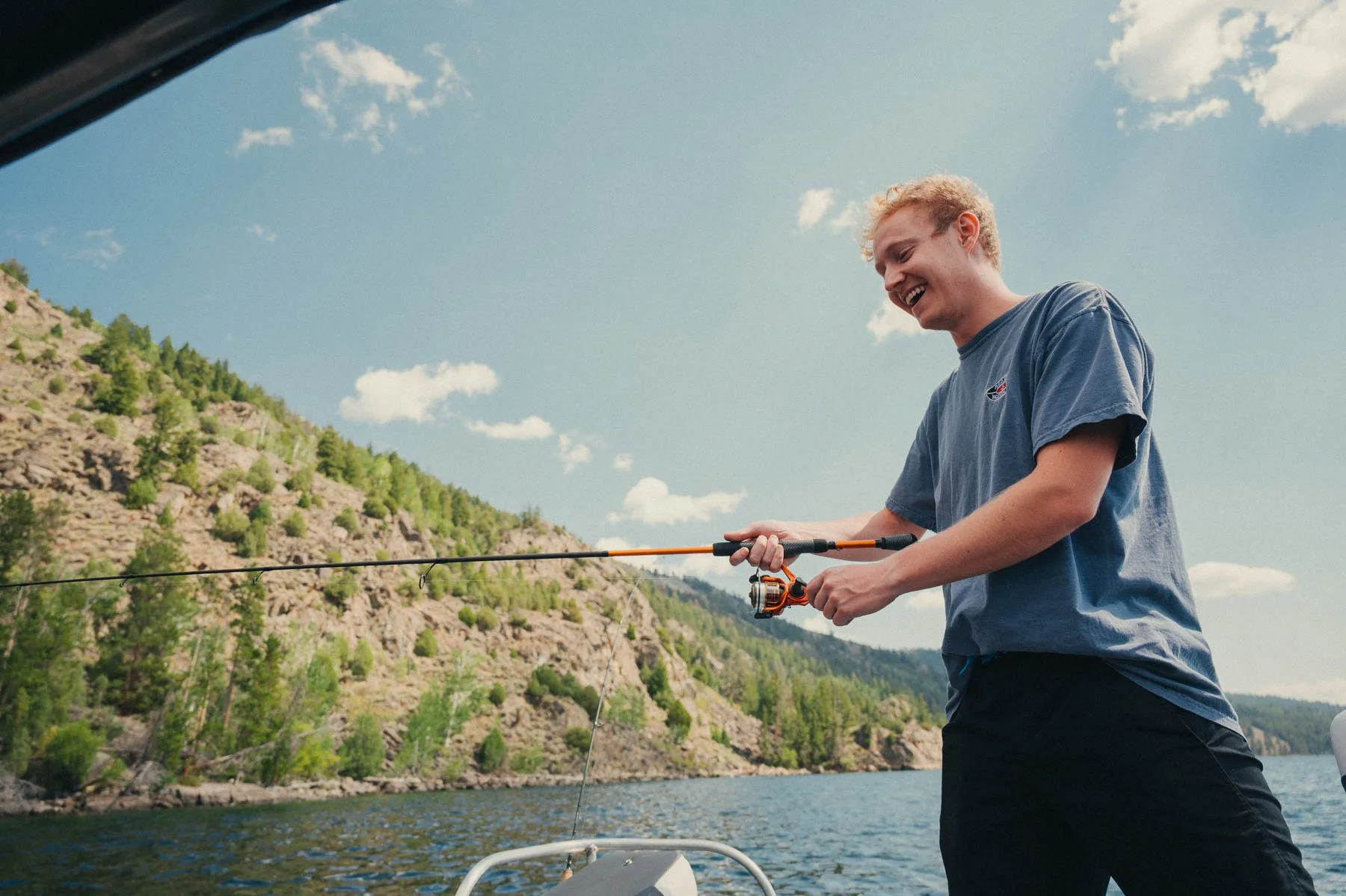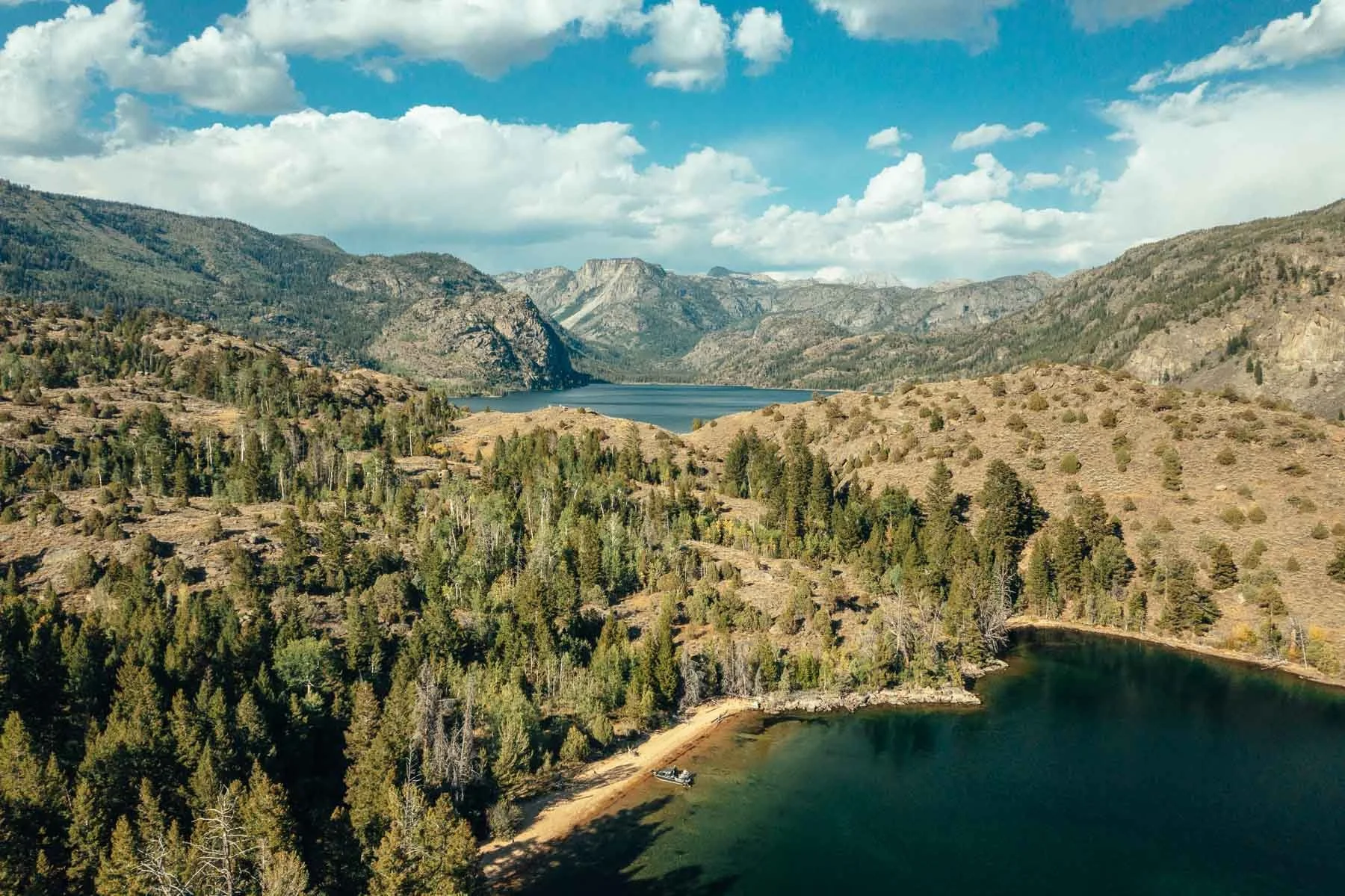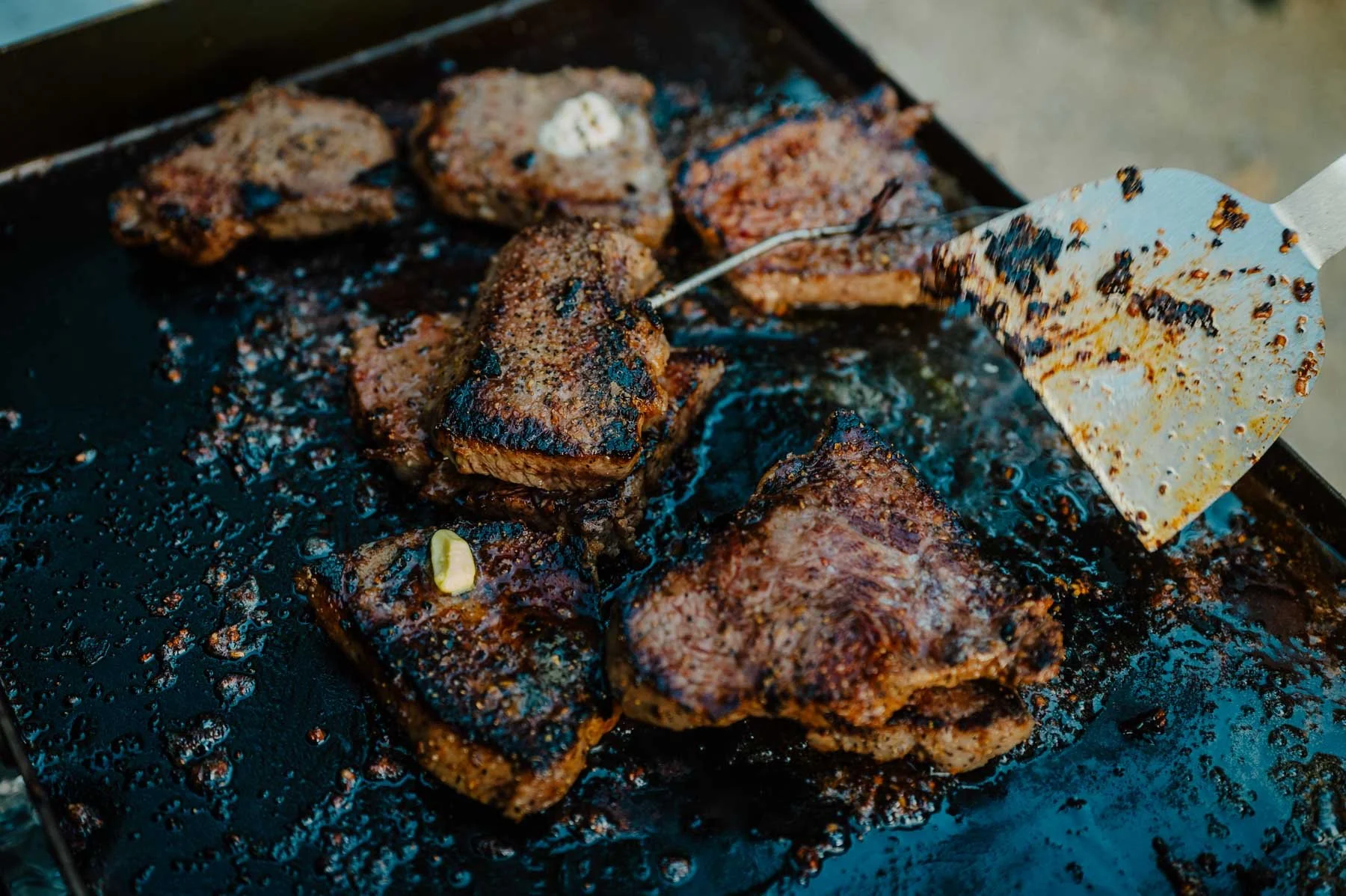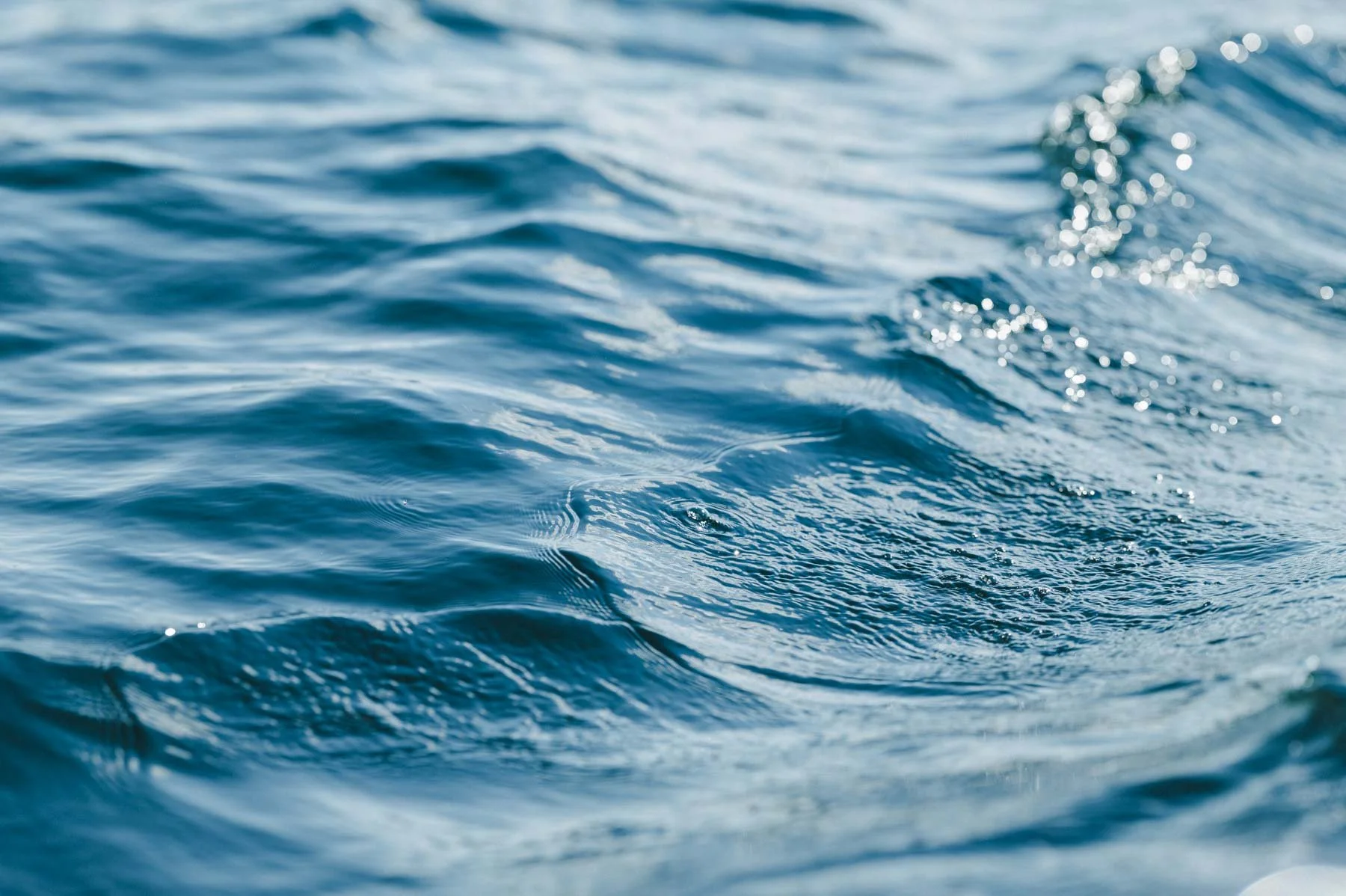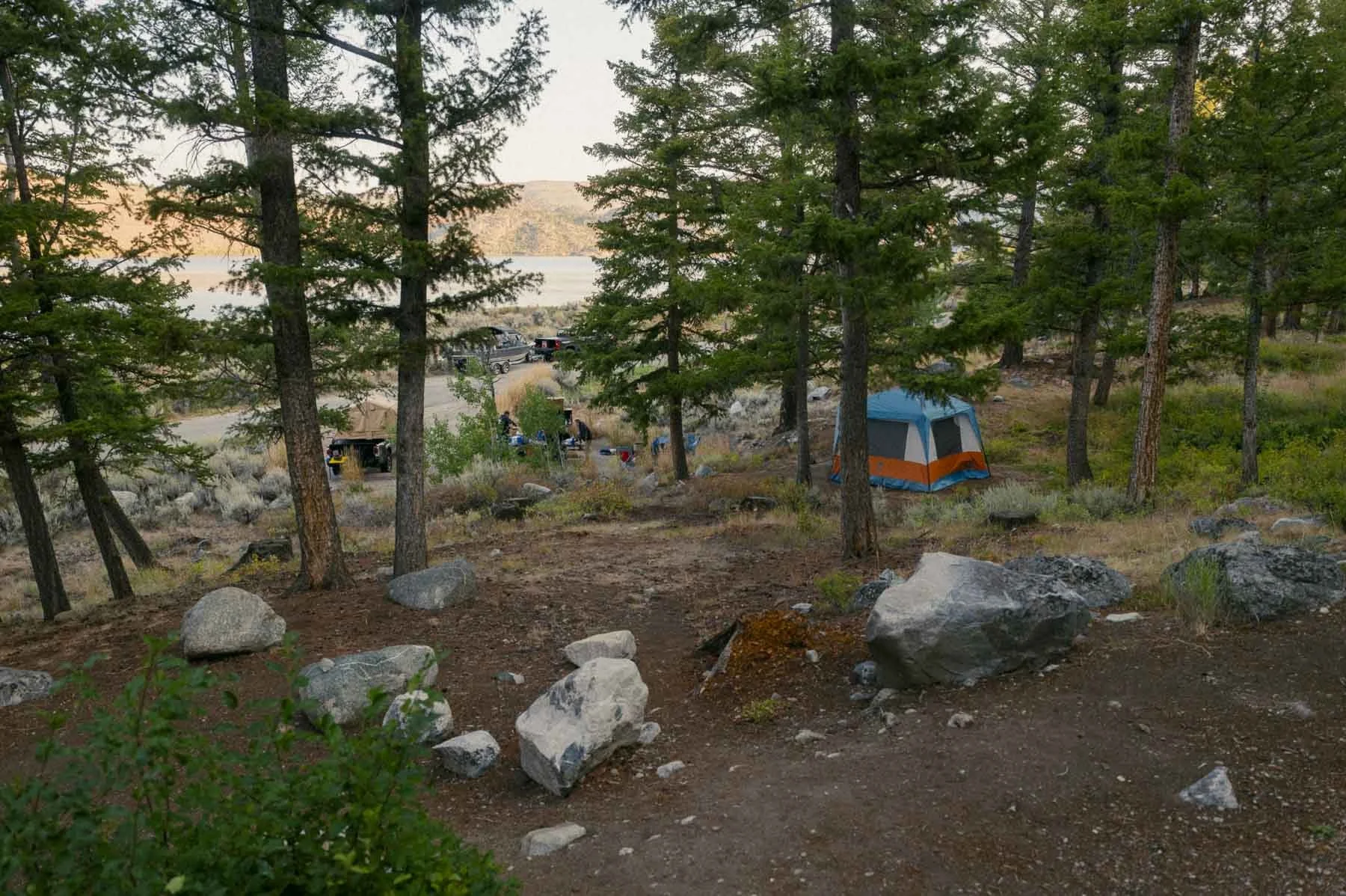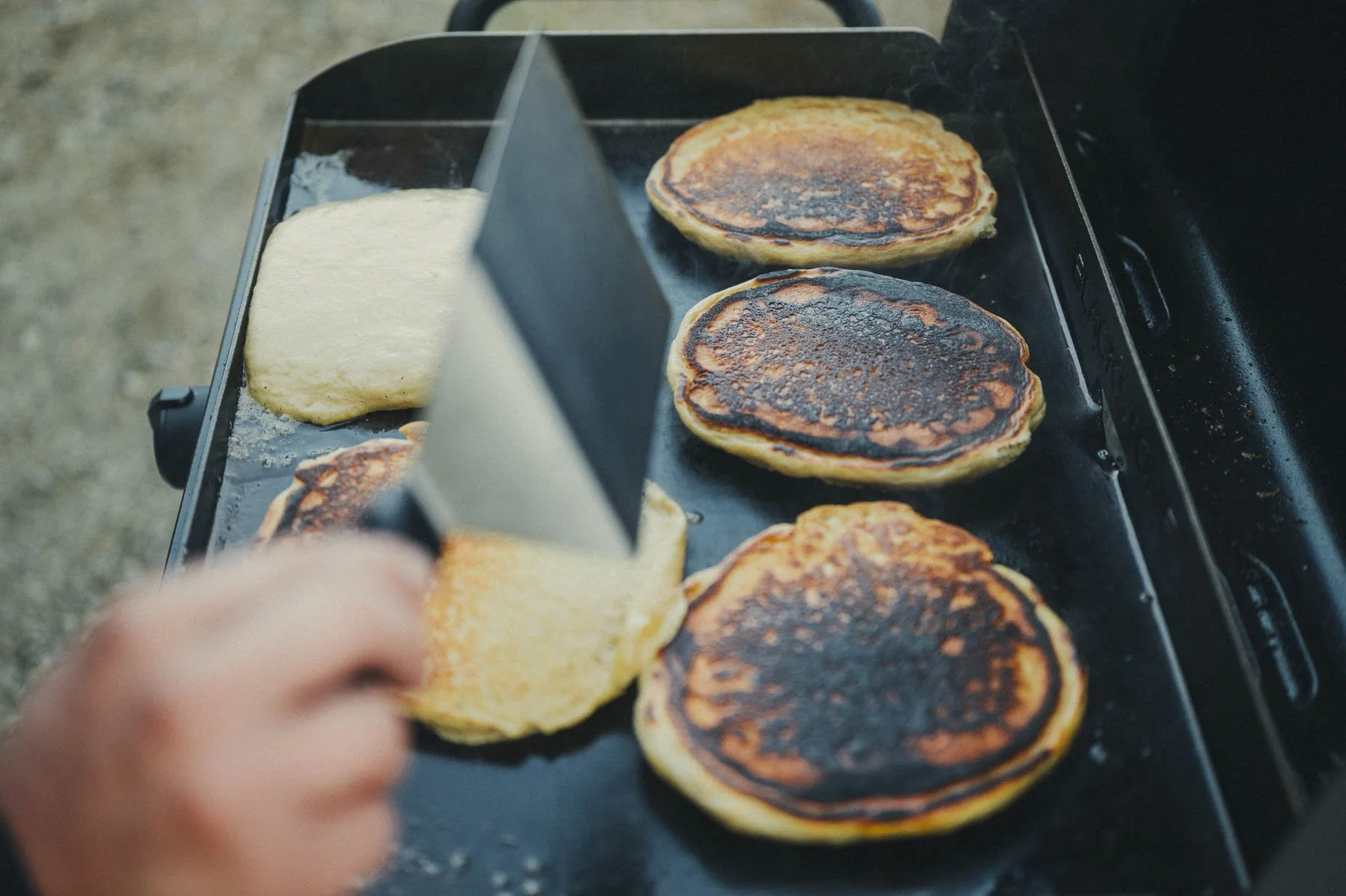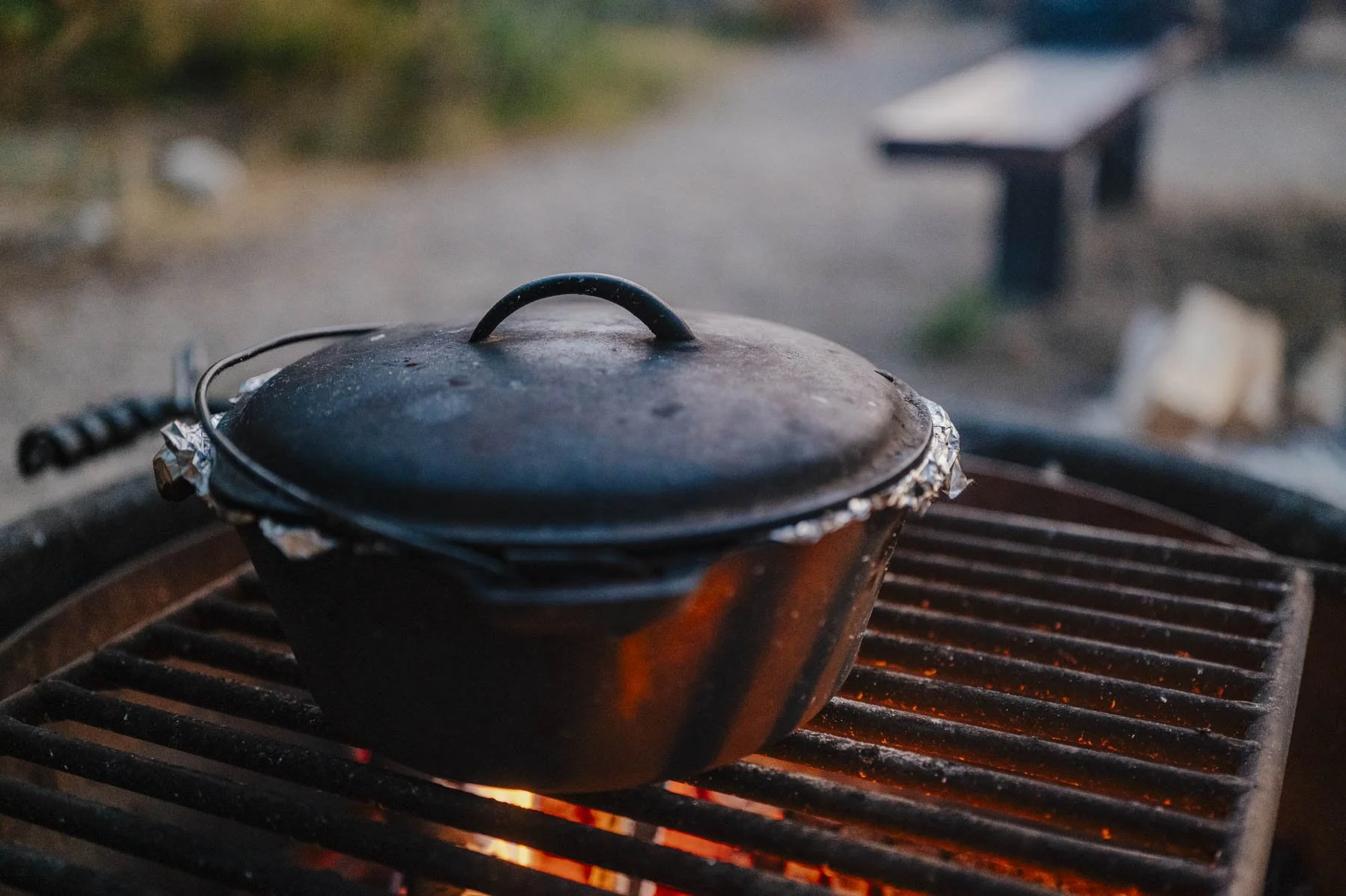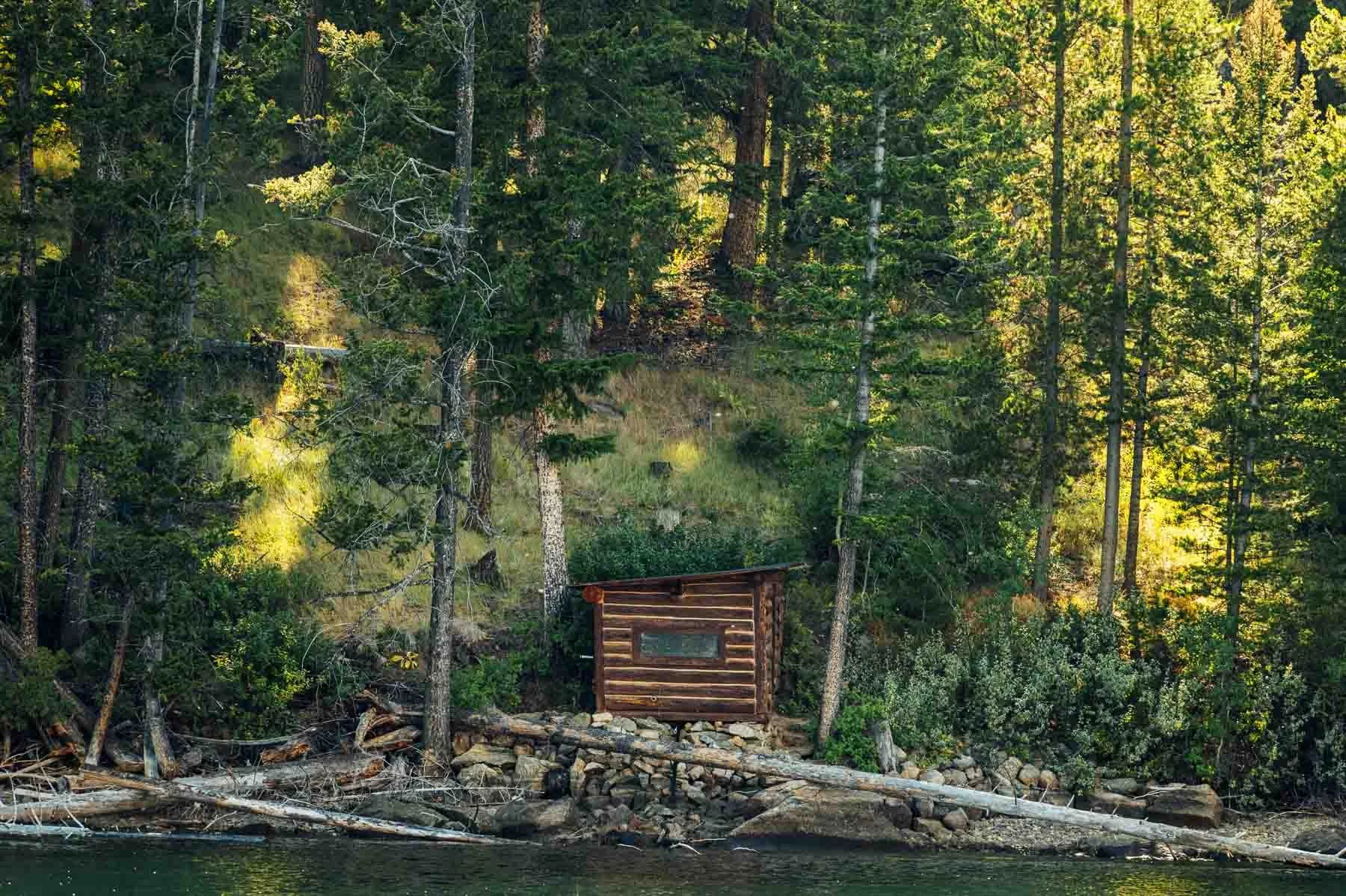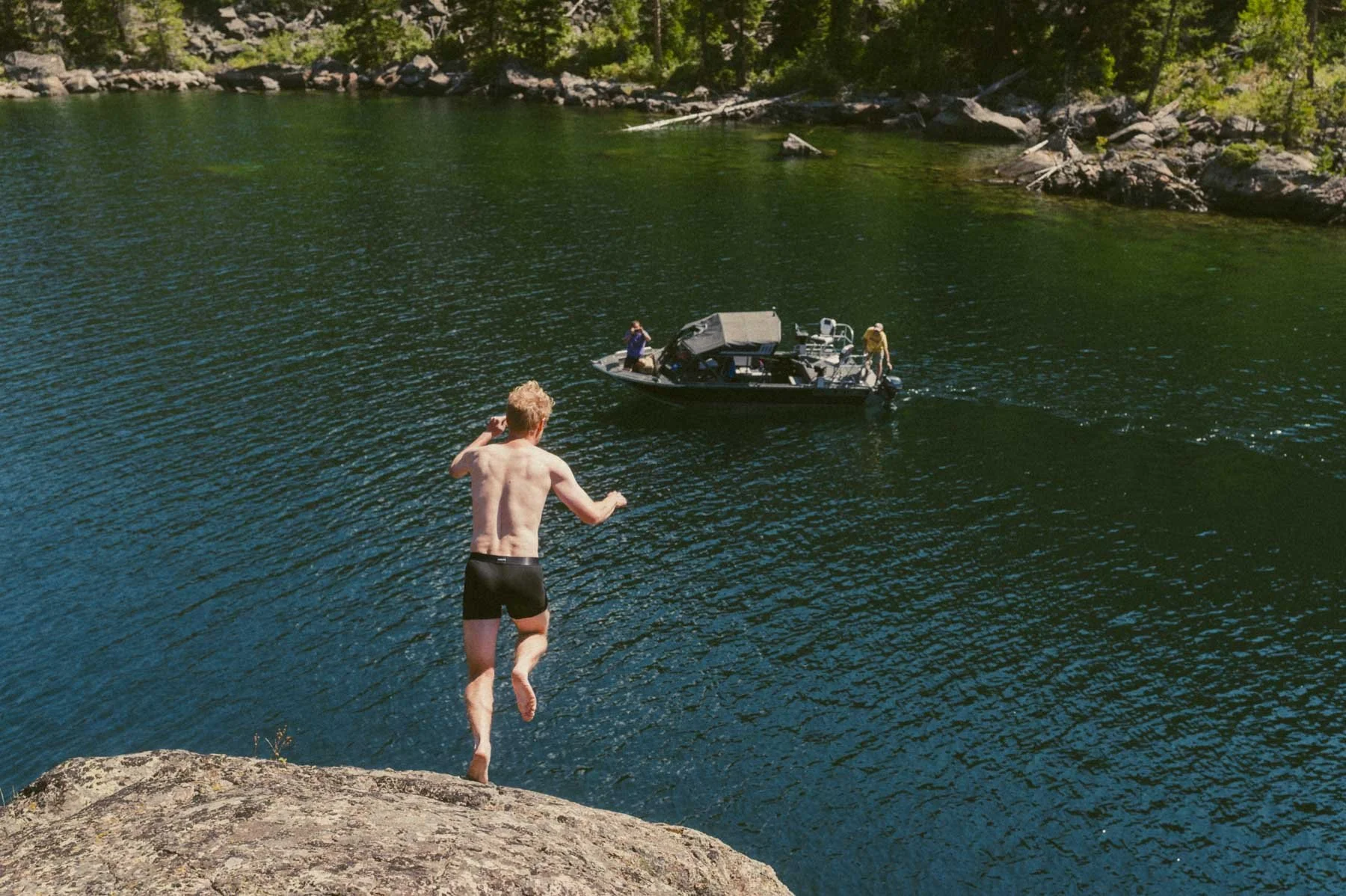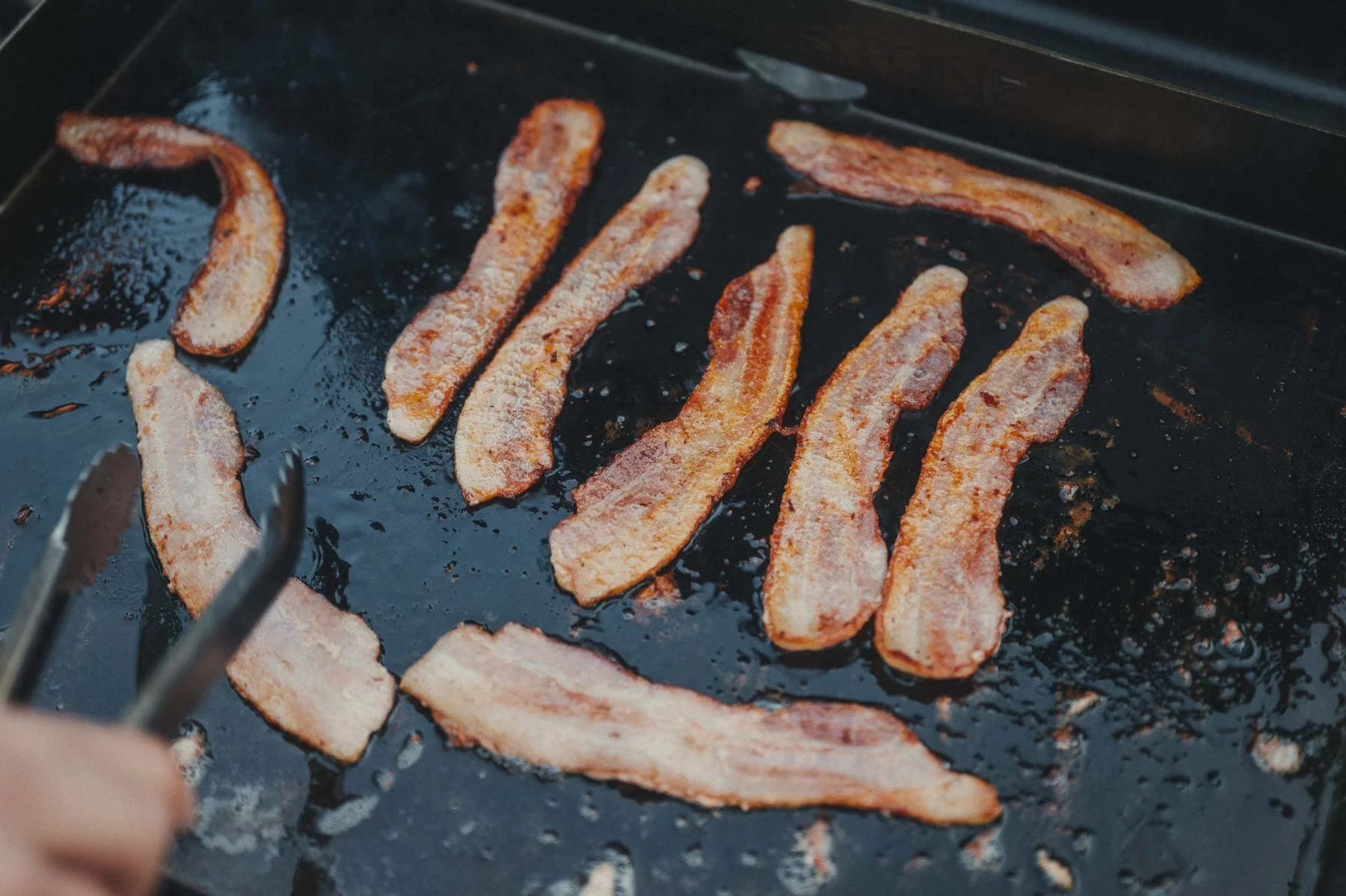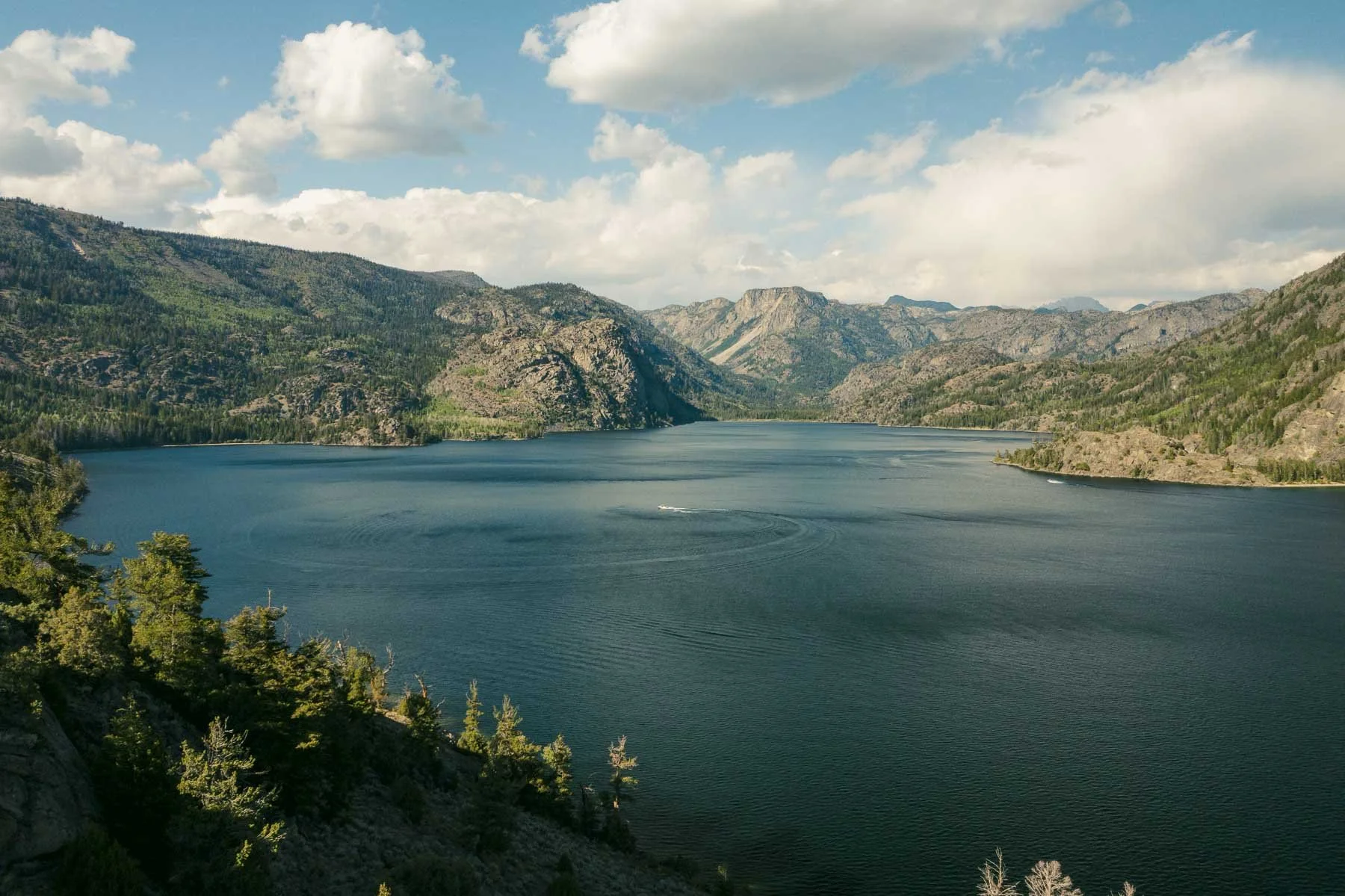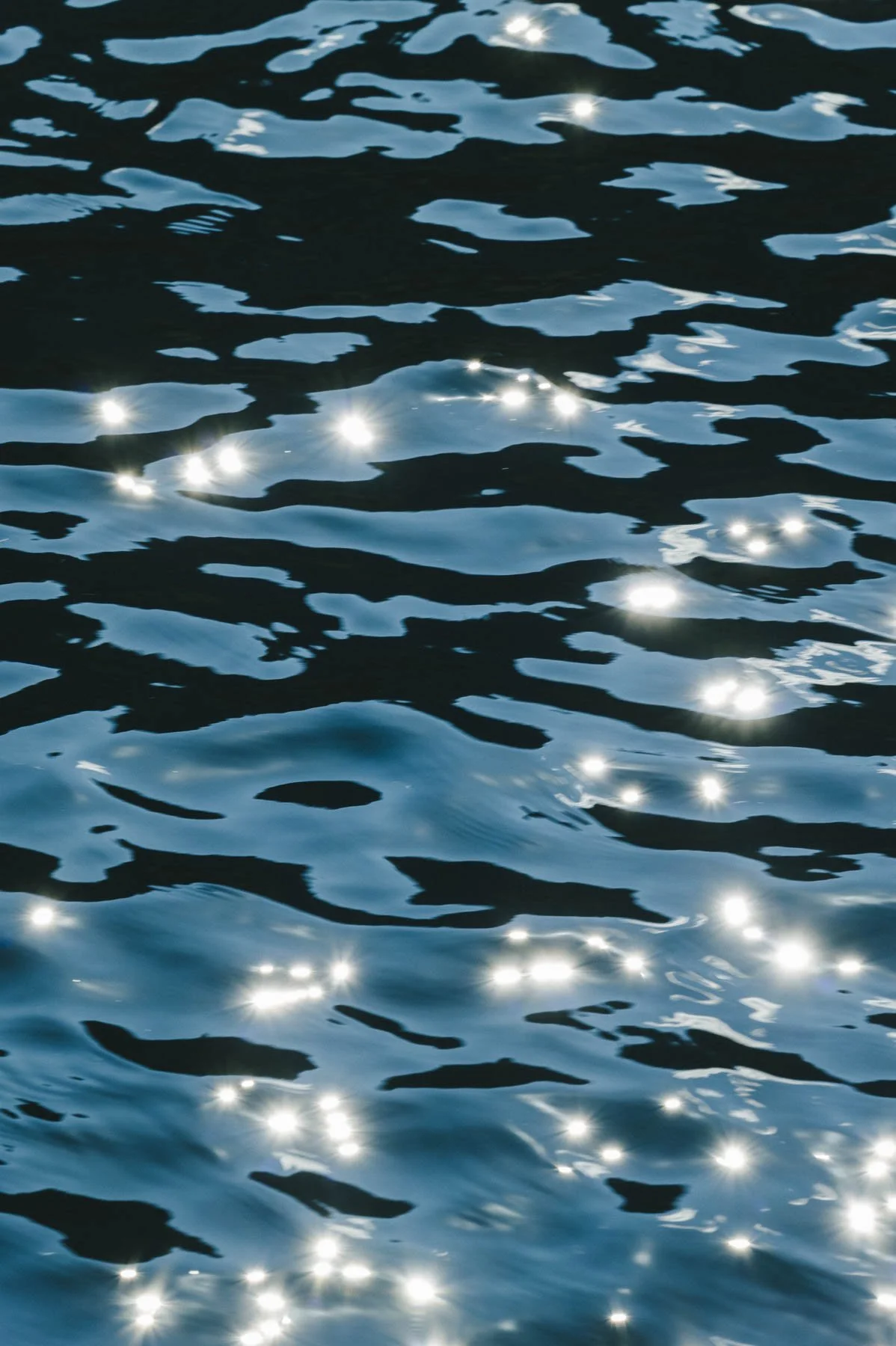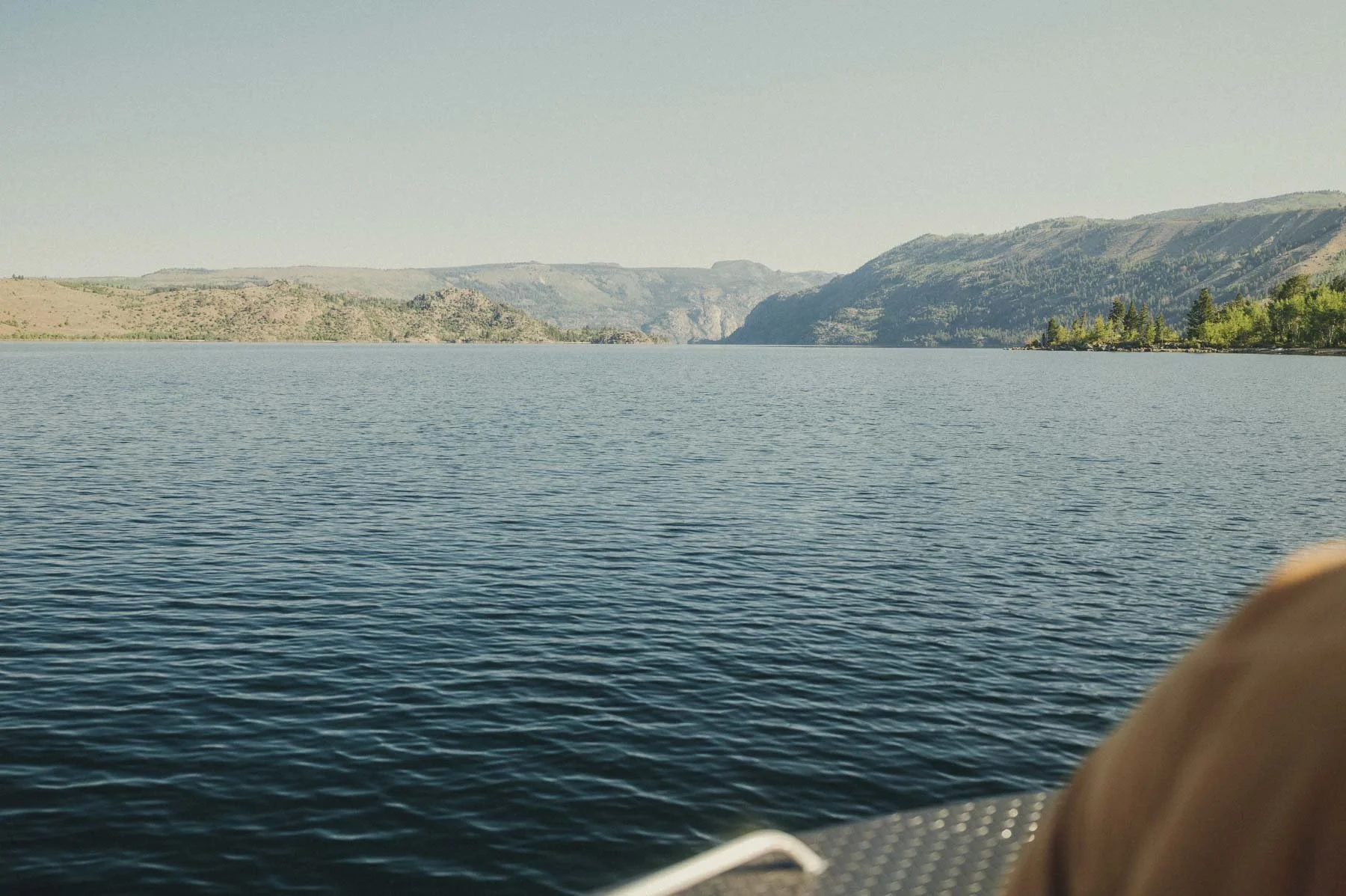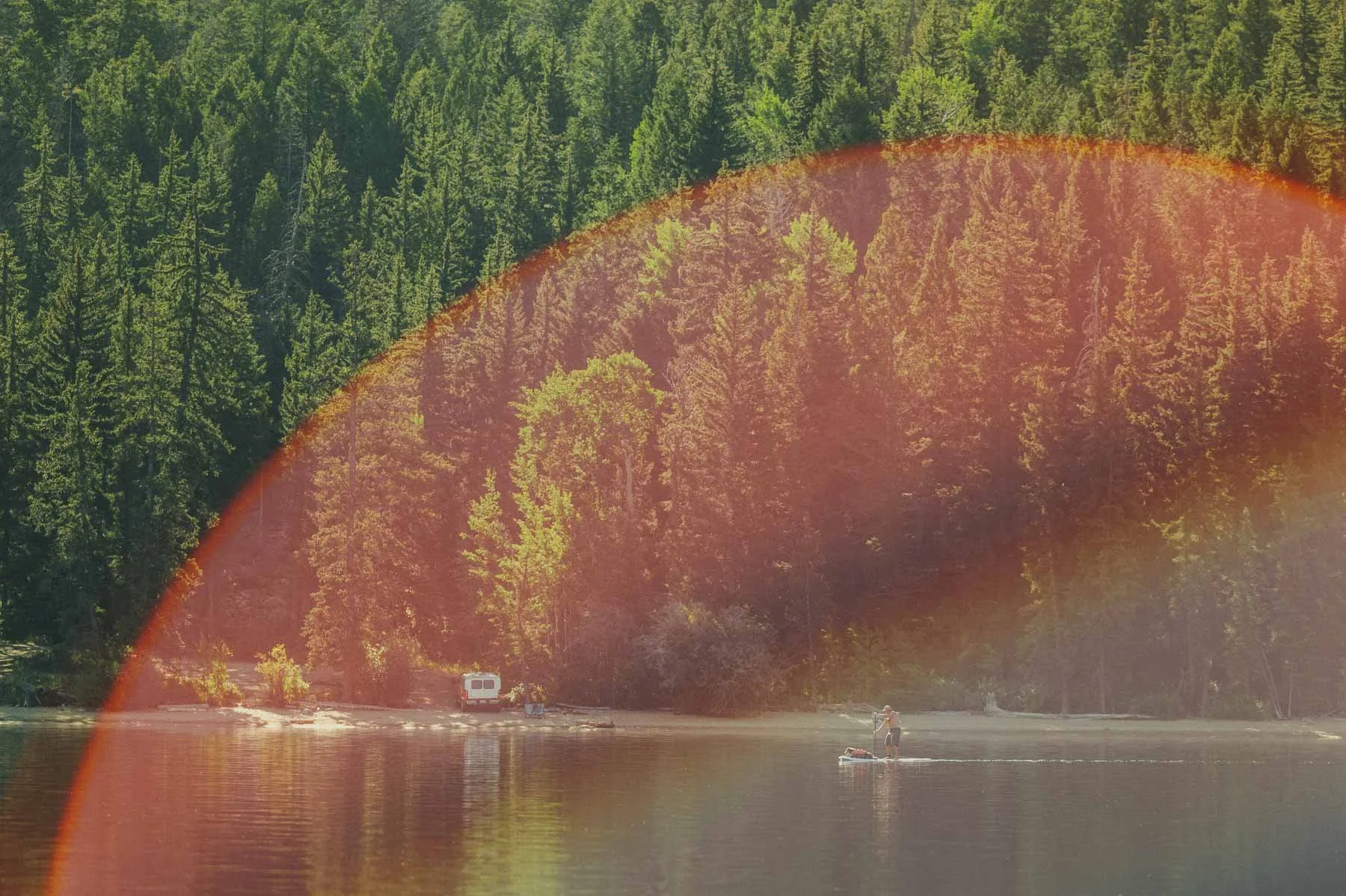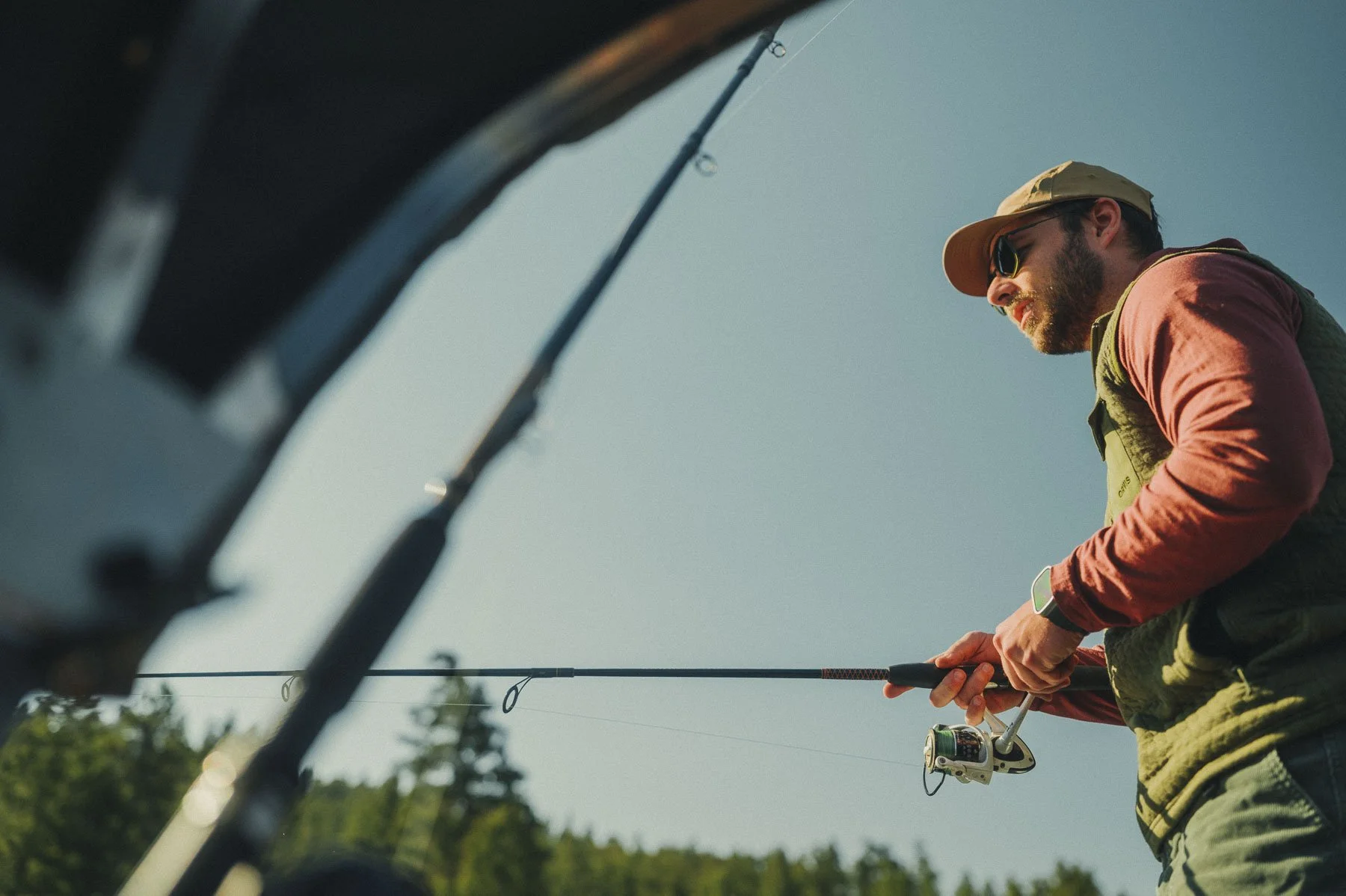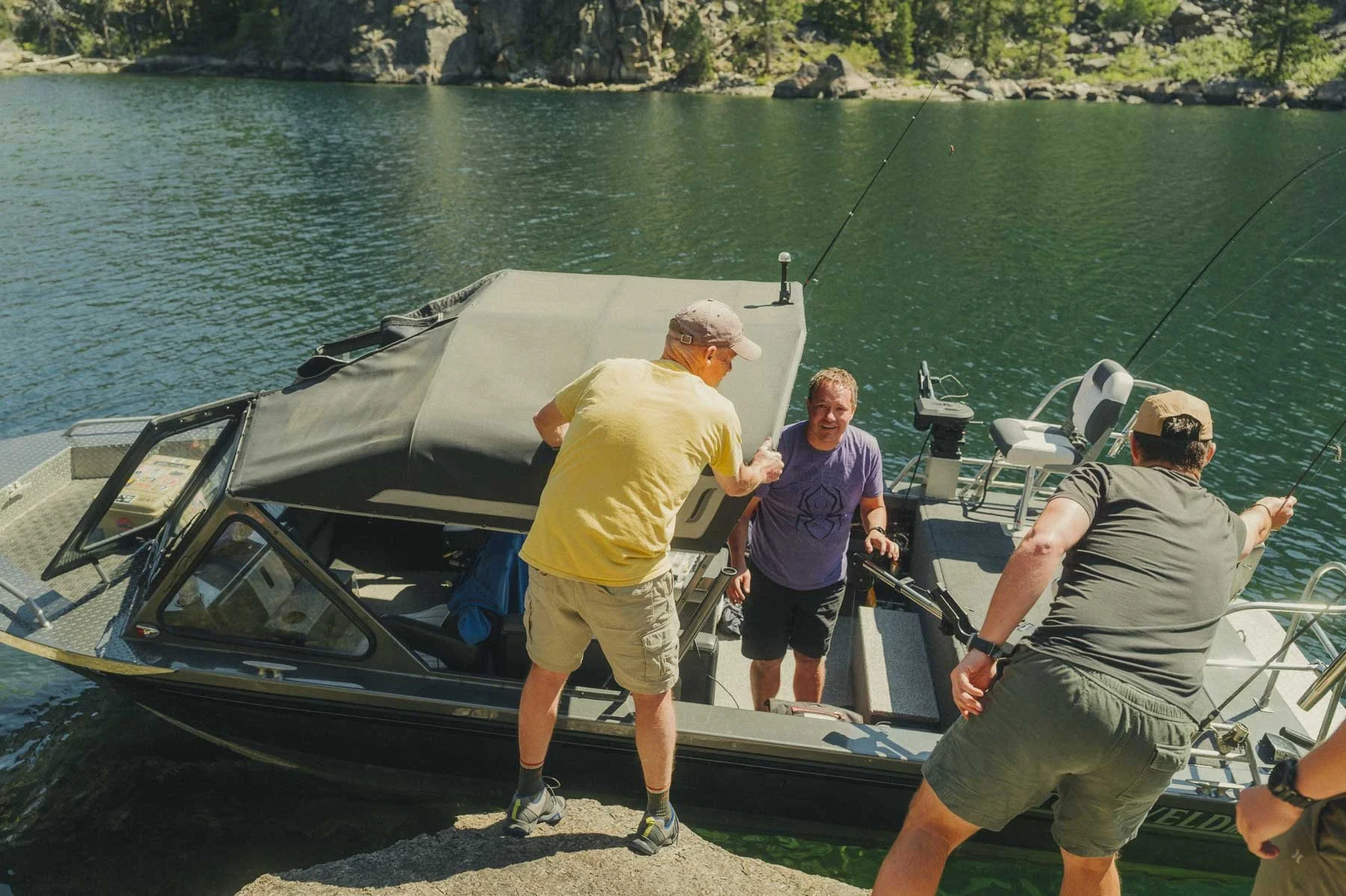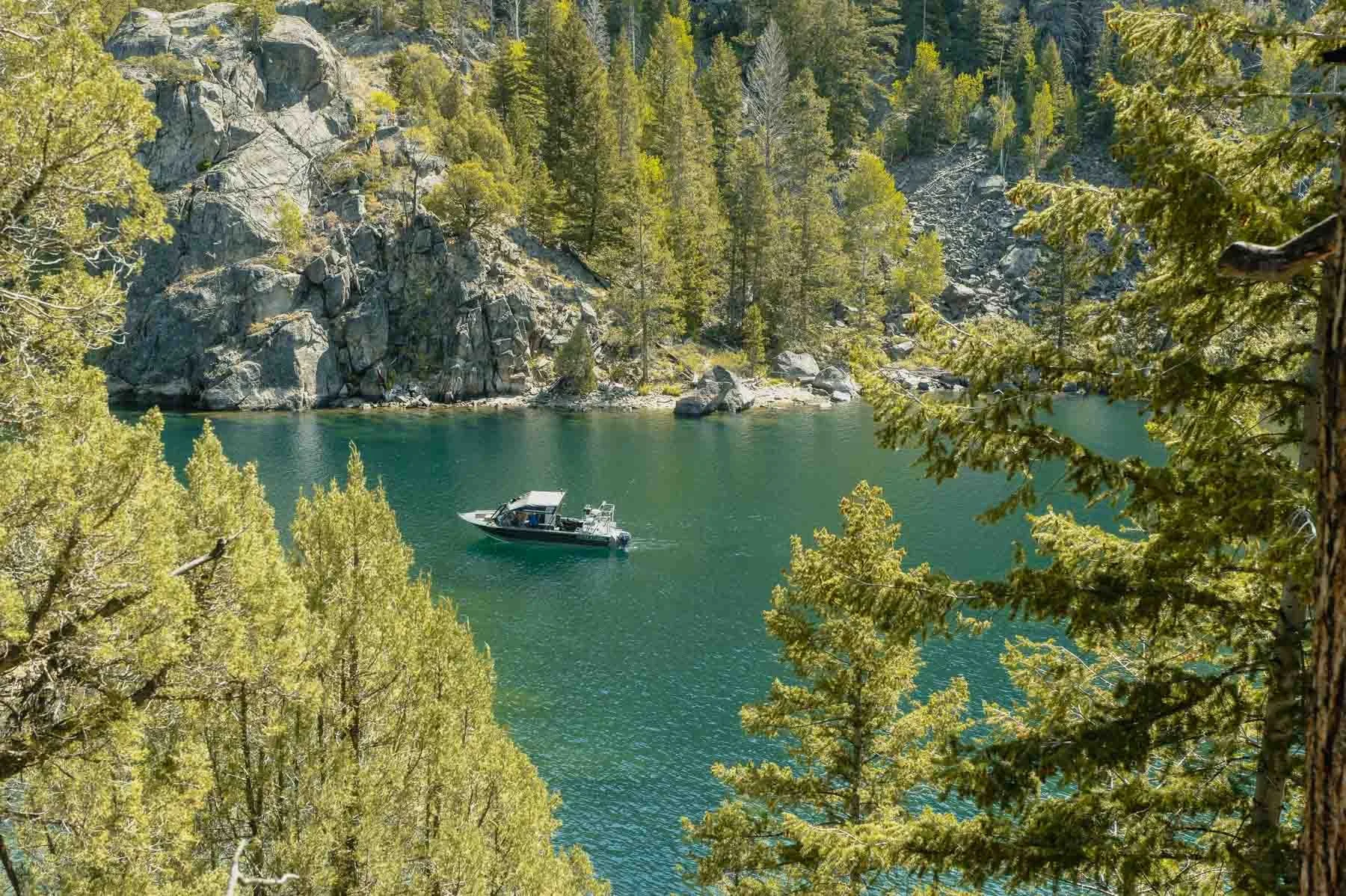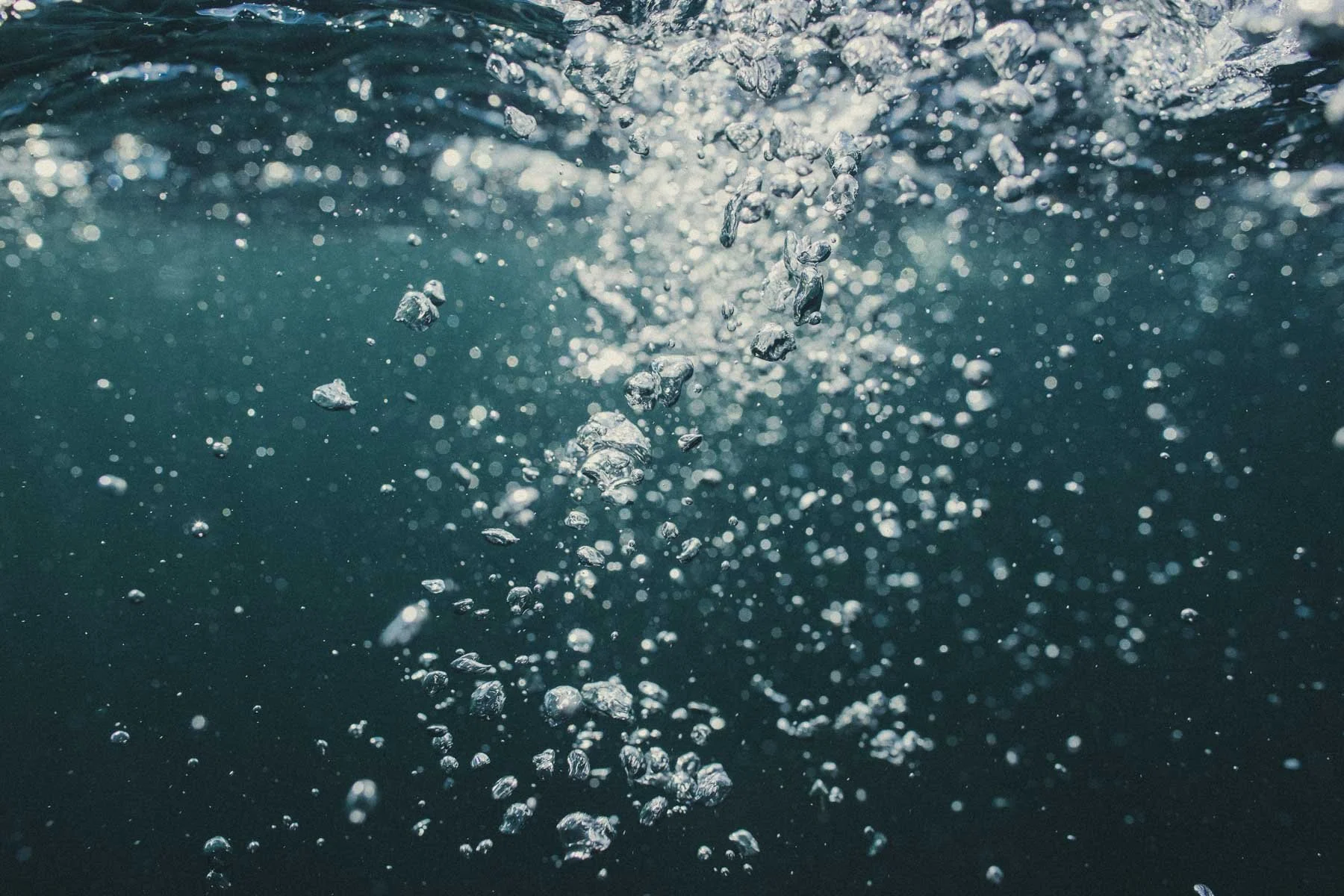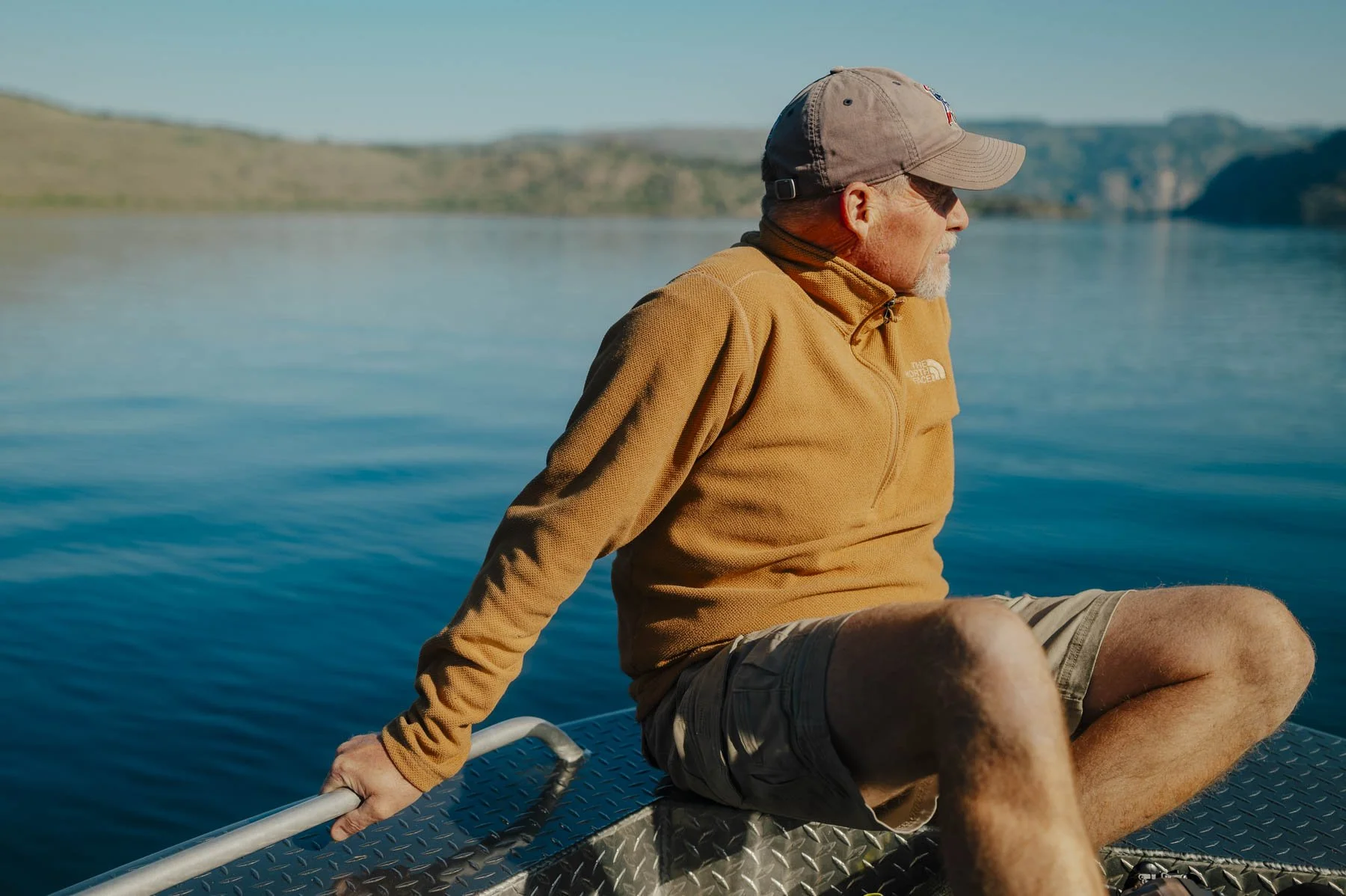What happens after you log off?
There’s really only one road — from East Idaho — that leads to Pinedale. You wrap around the Palisades Reservoir, follow its still blue water as the mountains frame the horizon, then wind past Jackson Hole. A slight right turn takes you through canyons and over old bridges, until the landscape finally opens.
There, in the distance, rises the plateau—the unmistakable, rugged silhouette of Wyoming. A place like no other.
But this trip wasn’t just about the road or the view. It started because of my dad. He wanted to take us on a boys’ trip before my youngest brother got married.
And of all places, Fremont Lake was where he chose. Not because it’s the biggest or best, but because it’s a place heavy with meaning. It’s where his father once took him as a boy.
There’s an old photo we all treasure—my grandpa sitting on an overlook above Fremont Lake. In the background, the water shines that impossible clear blue, and in the foreground, he’s looking out with a smile.
A rare, candid moment caught in time. He’s no longer with us, but the photo has become almost sacred. It’s a reminder of who he was, and the moments that shaped my dad—and by extension, us.
So this trip was more than fishing. It was part celebration of my brother’s new life with his fiancée, part remembrance of the life we’ve lost, and part tribute to the places that have marked our family story.
Fremont Lake, WY.
Of course, we came prepared. Probably more snacks than any reasonable group of men should admit to. I’m talking a hundred do nut holes—glazed, chocolate, and cake. Ten pounds of licorice. Another ten pounds of mixed nuts.
Enough sugar and food dye to fuel a small army. All stuffed into the cooler.
When we finally rolled up to the dock at Fremont Lake, we dropped the boat into the water. The air was cool, still, and carried that alpine freshness you can’t bottle.
We shoved off from the ramp, oars creaking, cooler rattling, and did what my grandfather and father had done before us.
We fished.
When a group of men—ranging from their early twenties to late fifties—gather for a trip like this, you never quite know what to expect.
The conversation ebbs and flows. At times it’s nothing more than rambling. Jokes. The usual.
But then, like the flick of a switch, something shifts.
Laughter gives way to memory. And memory gives way to meaning.
“Remember that time we went to Jackson Lake?” someone says, and just like that, we’re back there. “Remember how we always stopped at McDonald’s first? Saltiest fries on earth.”
Someone else chimes in— “Remember when we slept in Grandpa’s camper?”
We all do.
It’s one of those stories that gets funnier every time we tell it.
We’d told him we were cold. Real cold. And just before we laid our weary heads down for the night, he pulled out a candle.
He lit it with a flick of his thumb, held it up like it was some sacred torch, and with full conviction—still unclear if he was joking or not—he said:
“Don’t worry, boys. This’ll keep us warm.”
We all lost it. Still do.
It’s those kinds of moments—the silly ones, the sacred ones—that shape your boyhood. And, in a quiet way, shape the kind of man you become.
But the deeper lesson this trip reminded us of was something else entirely: The importance of logging off.
Not just from phones.
Not just from work.
But from the noise.
The constant flood of headlines and hustle. The scroll. The buzz. The invisible pressure to always be reachable.
Out here, none of that followed us.
No cell service. No notifications. Just a wide-open lake. Good company. And a cooler full of snacks.
And in those rare moments—when the lake is still, and the fish are biting, and the sun rests gentle on your shoulders—you find yourself thinking:
It doesn’t get better than this.
The water like glass. The wind barely a whisper. The mountains standing guard in the distance, silent and eternal. The trees sway gently. The scent of lake water in your nose. And that cold plunge—after a long day in the sun—takes your breath away every time.
It’s in those quiet, unremarkable moments that something remarkable happens.
You start to wish for more of them.
Now, we’re not pro fishermen—far from it. If this was our full-time job, we’d run out of money real quick. But every once in a while, it’s important to unplug from the chaos and plug back into something more real.
To log out of everything that distracts…
And log in to what matters.
To conversations that last longer than a scroll. To memories that live longer than a highlight reel. To the simple, sacred act of sitting still.
Of reconnecting—with the land, with your brothers, with your roots.
Of remembering who you are.
Now, we didn’t catch much—as much as we’d hate to admit it.
All those hours on the water, and we pulled in fewer than a dozen fish between us. A couple trout. Maybe one we shouldn’t even count.
The kind you release not because you’re being ethical, but because you’re embarrassed.
But here’s the thing: it was never about the fishing.
It wasn’t about the numbers.
It was about what we felt while we were fishing—the silence, the laughter, the ease.
It was about what happens when a group of men—all in different chapters of life—sit still long enough for the world to slow down.
What it did to bring us together—not just as a family, but as a brotherhood.
You realize, out there, how rare that kind of connection is. How hard it is to come by. And how easy it is to take for granted.
It’s hard to complain when you’re surrounded by that kind of beauty. When the water stretches on forever. When the breeze is gentle and your only responsibility is to be present.
Moments like these are few and far between.
Especially in a world where inboxes flood faster than rivers—emails pouring in like M&Ms coated in Red 40.
(And not just any M&Ms. We’re talking crunchy peanut M&Ms—the ones you secretly hoard and pretend you don’t like that much.)
But the truth is, those distractions can wait. Because for once, we weren’t just checking messages.
We were living one.
On the drive home, my older brother—Landon—sat beside me. He’s more than a brother. He’s one of my best friends, second only to my wife.
Somewhere between the Wyoming border and Idaho Falls, we started asking the kind of questions you don’t ask often enough. The kind that bypass small talk and go straight to the soul.
I turned to him, the hum of the 7.3 Power Stroke engine rumbling beneath us like a slow heartbeat, and asked: “What’s one trait you hope your kids carry with them — something they have learned from you — into their own lives?”
He smiled as the truck came to a stop — it was time to load up on caffeine before heading home.
“I hope they see the grit,” he said, raising his voice slightly.“I hope they understand what it means to work hard. To do hard things. To know they can.”
I nodded. “That’s a great answer.”
Then he turned to me. “What about you? What do you want your girls to take from the life you’ve lived?”
That’s when it hit me.
I thought back to one of the most challenging seasons of my life. I’d dislocated my knee. I was out of work for nearly a year. We were living in my in-laws’ basement, expecting our first child.
There were nights I lay awake wondering how we’d make it—financially, emotionally, spiritually.
And yet… It became one of the most defining seasons of my life. Not because I overcame something heroic. But because my wife, during that time, told me how proud she was of me.
Not for fixing everything. Not for climbing the ladder. But for not giving up.
That’s what I want my daughters to remember.
That hope matters. That faith matters.
That when everything else is stripped away—your status, your title, your sense of control—those two things remain.
And they are intertwined like best friends. You can’t have one without the other.
So yes, it’s important to log off.
It’s okay if you forget your password.
It’s okay if you miss a text.
Because logging in to something more important—something deeper, something sacred—matters more.
The planet.
The people.
The stories.
The stillness.
That’s what it means to truly live.
Now, I’ll admit something.
There were moments when I was restless.
The lake was calm.
The photos had been taken.
I had no service.
And I found myself wondering—what now?
Because we’re taught that if we’re not busy, we’re falling behind. That if we’re not grinding, we’re not growing.
That motion is progress.
But I’d argue the opposite.
Because if you’re always moving, always chasing… When do you ever actually arrive?
Some of the clearest thoughts I’ve ever had have come not during the hustle, but in stillness.
Moments when I was sitting on the edge of a boat, with nothing to do, and nowhere else to be.
Clarity doesn’t come from confusion. It comes from simplicity.
And when you simplify—when you log off, even for just a little while— that’s when clarity shows up.
That’s when the real signal bars appear.
Not the kind on your phone. But the kind you carry in your heart.The kind that reconnects you—to yourself, to the people around you, and to the wild, wide-open world just waiting to be noticed.

